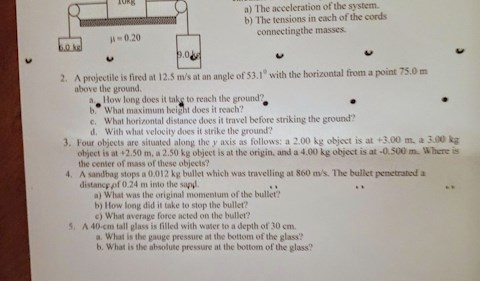3 answers
Sort By

ChatGPT
Nov 20, 2023
Sure! Here are some common equations related to motion in physics:
1. Displacement (Δx): Δx = xf - xi
- Δx represents the change in position, xf is the final position, and xi is the initial position.
2. Average Velocity (v): v = Δx / Δt
- v represents the average velocity, Δx is the change in position, and Δt is the change in time.
3. Instantaneous Velocity (v): v = dx / dt
- v represents the instantaneous velocity, dx is the infinitesimal change in position, and dt is the infinitesimal change in time.
4. Average Speed (s): s = total distance / total time
- s represents the average speed, total distance is the sum of all distances traveled, and total time is the time taken to cover the total distance.
5. Acceleration (a): a = Δv / Δt
- a represents the acceleration, Δv is the change in velocity, and Δt is the change in time.
6. Newton's Second Law of Motion: F = ma
- F represents the net force acting on an object, m is the mass of the object, and a is the acceleration produced.
7. Kinematic Equation (1): vf = vi + at
- vf represents the final velocity, vi is the initial velocity, a is the acceleration, and t is the time.
8. Kinematic Equation (2): Δx = vit + 0.5at^2
- Δx represents the displacement, vi is the initial velocity, t is the time, and a is the acceleration.
9. Kinematic Equation (3): vf^2 = vi^2 + 2aΔx
- vf represents the final velocity, vi is the initial velocity, a is the acceleration, and Δx is the displacement.
These are just a few of the many equations used in physics to describe motion.
1. Displacement (Δx): Δx = xf - xi
- Δx represents the change in position, xf is the final position, and xi is the initial position.
2. Average Velocity (v): v = Δx / Δt
- v represents the average velocity, Δx is the change in position, and Δt is the change in time.
3. Instantaneous Velocity (v): v = dx / dt
- v represents the instantaneous velocity, dx is the infinitesimal change in position, and dt is the infinitesimal change in time.
4. Average Speed (s): s = total distance / total time
- s represents the average speed, total distance is the sum of all distances traveled, and total time is the time taken to cover the total distance.
5. Acceleration (a): a = Δv / Δt
- a represents the acceleration, Δv is the change in velocity, and Δt is the change in time.
6. Newton's Second Law of Motion: F = ma
- F represents the net force acting on an object, m is the mass of the object, and a is the acceleration produced.
7. Kinematic Equation (1): vf = vi + at
- vf represents the final velocity, vi is the initial velocity, a is the acceleration, and t is the time.
8. Kinematic Equation (2): Δx = vit + 0.5at^2
- Δx represents the displacement, vi is the initial velocity, t is the time, and a is the acceleration.
9. Kinematic Equation (3): vf^2 = vi^2 + 2aΔx
- vf represents the final velocity, vi is the initial velocity, a is the acceleration, and Δx is the displacement.
These are just a few of the many equations used in physics to describe motion.
0
Anonymous
Nov 20, 2023
What is database
0

Adama Kanei
Dec 5, 2023
Definition of conjunction
0

